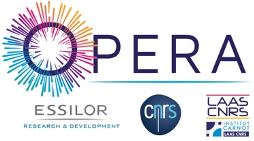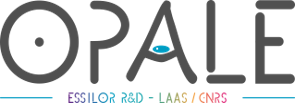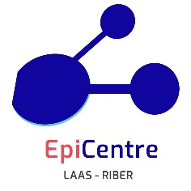Joint labs
The laboratory is involved in several joint research structures:
OPERA
Partners since 2004, Essilor and the CNRS had signed a research contract on December 14, 2015, associating the optical solutions specialist and the LAAS-CNRS for a period of 5 years.
Within this joint laboratory OPERA (OPtique EmbaRquée Active in french) located in Toulouse, a joint and multidisciplinary team of researchers and engineers continued research on lenses and glasses with active and connected functions. These technologies have made it possible to design new generations of high-performance optical lenses.
OPERA has resulted in the development of active electrochromic lenses that improve vision and comfort for the user by protecting him or her from glare. This is a new product, currently being industrialized at the Dijon site, and is the basis for a new cycle of innovation and economic development.
OPALE
This success led Essilor and the LAAS-CNRS to pursue their partnership, giving rise to the new OPALE laboratory, OPtiques Actives et Lunettes instrumEntées in french, for a period of four years.
Based on the technological foundation and cross-fertilization built over more than 10 years, Essilor and the CNRS have signed a new research contract focused on innovative optoelectronic components, continuing their research efforts in the field of active optics for vision control.
While maintaining a systems approach, OPALE will focus on new active optics and functionalities for the wearer of corrective lenses and on the link between these optics and the wearer's vision. It aims to lay the groundwork for new competencies in the field of biophysical servoing, sensory and environmental sensors as well as algorithmic control methods at the frontier of life sciences and conversion technology.
EPICENTRE
EPICENTRE is a joint laboratory created with Riber company in the objective of implementing a technological innovation strategy in the field of MBE through a common governance and a research plan designed to lead to the development of a set of technological building blocks. They will share their respective expertise in molecular beam epitaxy (MBE) for a period of six years. The first challenge will be to develop a set of measurement tools providing ultimate control of complex epitaxial processes. The second challenge will be dedicated to the development of a solution dedicated to the growth of superconducting materials for applications in the field of quantum computing. In parallel, the Epicentre laboratory will initiate work on machine learning (AI).
ROB4FAM
ROB4FAM is a joint laboratory with Airbus, created in 2019 and which purpose is to develop robotic technologies adapted to aeronautical production. One of the scientific challenges of Rob4Fam, Robots For the Future of Aircraft Manufacturing, is to provide robots with a reactivity capability. It means to ensure that they are able to detect a change in their work environment and make a decision in real time to adapt to it. For example, a "reactive" robot will have to stop as soon as it perceives the intervention of a human operator, then resume its task taking into account the modifications made
Rob4Fam is also working on a project to develop technologies that can be adapted to different generations of robots.
LICUR
LICUR, the instrumentation and ultrafast sensors laboratory, was inaugurated on Thursday, April 7 at LAAS-CNRS, in the presence of Carole Delga. This joint research laboratory between LAAS-CNRS and CEA-Gramat seals for 5 years a scientific collaboration initiated in 2012 with the support of the Languedoc Roussillon Midi-Pyrénées Region.
The objective of LICUR is to develop new ultra-fast measurement systems adapted to the targeted applications: improvement of the safety of infrastructures and transport to all types of aggressions (intentional or accidental) with high temporal gradient (electro-magnetic, mechanical, thermal and thermo-mechanical).
IMPYACT
LAAS-CNRS and LACROIX, which specializes in pyrotechnic systems for defense and aerospace, have joined forces to create Impyact. Within this joint laboratory inaugurated on November 23, 2016, they share their respective skills in pyrotechnics and nanomaterials to develop new countermeasure systems (rockets and explosives used as decoys in the defense sector) and pyrotechnic ignitions.
BIOSOFT
LAAS-CNRS and Innopsys created the joint laboratory BIOSOFT in the early 2014.
BIOSOFT concerns the development of flexible technological processes directly applicable to the industrial production of biosensing systems.
Its is aimed to schedule a structured technological innovation to study, validate and transfer in the field of laboratory diagnosis using microarray devices or biosensors produced at low cost by soft lithography. Technological processes revolve around molecular buffering biomolecules and capillary assembly, two methods developed since 2004 in the laboratory as well as in society through an active partnership (Region and ANR projects, theses Cifre).
The relevant markets are those of instrumentation for scientific laboratories and medical diagnosis. An experimental room in the LAAS-CNRS is dedicated to the project. It includes instruments and prototypes provided by Innopsys as well as lab equipment for characterization and "benchmarking" of the new studied products. BIOSOFT will achieve the technological innovations started in 2013, perform industrial transfer and allow valuing by society.
AIRSYS Cooperation Agreement
The Airsys partnership -Architecture and Systems Engineering in the field of systems for aviation- is a cooperation agreement between the LAAS-CNRS, the Institut de recherche en informatique de Toulouse (IRIT) and Airbus.
Airsys covers aircraft systems, airborne and ground, whether in flight systems, maintenance, onboard power supply, communication and information management. The roadmap for the coming years has four priority areas:
- the avionics platform;
- flight control;
- systems engineering;
- the concepts of reliability, availability and diagnosis.
Workshops allow forward thinking, project definition and planning of theses. Airsys represents an annual volume of business about a hundred FTE (full time equivalent), divided into forty projects.
